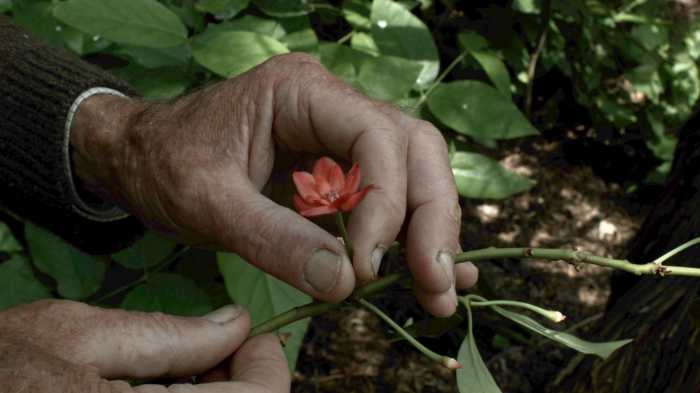Financier Rainer Voss looks out on the skyscrapers of Frankfurt’s financial district. | AUTLOOK FILMS
BY STEVE ERICKSON| Anthology Film Archives’ program notes liken German director Marc Bauder’s “Master of the Universe” to “a kind of minimalist documentary version of ‘The Wolf of Wall Street.’”
Martin Scorsese’s film is an ambitious attempt to treat capitalism — or at least materialism and corporate culture — as an addiction, acknowledging its mix of pleasures and dangers, but it gets bogged down in its infatuation with excess. In contrast, Bauder’s austerity helps him keep a clear head.
There’s only one “character” in “Master of the Universe”: former investment banker Rainer Voss. Bauder, who has studied both business administration and filmmaking, shot Voss speaking over the course of several days and nights in an empty building in Frankfurt left abandoned after a failed merger of two banks.
Marc Bauder’s study of a failed investment banker offers grim assessment of where we’re headed
The filmmaker pays a great deal of attention to style; “Master of the Universe” is one of the few recent documentaries shot in Cinemascope. Indeed, Bauder’s long-shot vistas of Frankfurt skyscrapers, in which people are tiny but unmistakable presences, resemble Andreas Gursky’s photos.
One can sense two Bauders battling it out for control of “Master of the Universe.” One director just wants to let Voss speak with little to no interruption, while the other illustrates his words with the now-empty spaces of Germany’s failed banks. Voss does much of talking from the former stock trading floor, whose small size he notes. Indeed, such physical places are now a thing of the past, he informs us; chat rooms have taken the place of huge, loud trading floors.
The stillness of Bauder’s “set” seems filled with ghosts, although the audience isn’t informed about the building’s exact nature until the closing credits. Presumably, his shots of the Frankfurt skyline, which still contains plenty of thriving banks (as Voss points out in an early scene), are taken from the building’s windows. The only exterior appears to be the building’s roof, and the film ends with Voss driving away.
“Master of the Universe” would have fit into Anthology’s “Talking Head” documentary series held a few years ago. At the same time, the cinematography captures a chilly gloss that seems to define contemporary Austrian cinema, fiction and non-fiction. (Although Bauder isn’t Austrian, much of his film’s production money is.) If Michael Haneke and Ulrich Seidl were in the business of creating heroes instead of anti-heroes, I could even see them coming up with a man like Voss.
Economics is a field that’s notoriously prone to jargon and difficult to explain to people who aren’t specialists, although the success of Michael Lewis’ books suggests an appetite for understanding it. “Master of the Universe” doesn’t rely too heavily on jargon, but there are a few places where I got lost.
For the most part, Voss’ descriptions of the human cost of being a successful investment banker are more compelling. In the film’s opening scene, he relates being pressured to work “one-nighters” and “two-nighters” — essentially ignoring his family to stay up all night toiling away for the bank. An investment banker’s success is dependent on his willingness to give up his personal life. I used the word “his” in the last sentence deliberately; as described by Voss, the banking world seems oppressively macho, and I can’t imagine how a woman with any desire to raise a family could navigate its demands.
Voss seems a more dubious source when he suggests that some nameless organization deliberately triggered Greece’s economic crisis as a way of destroying the Euro, has gone on to do so with Portugal, Spain, and Italy, and has the eventual goal of driving France into depression. It’s not that this couldn’t happen, but Voss offers conspiracy theories with no real evidence. He’s on more solid ground when he points out how interwoven the world’s economies have become and how their delicate dependency has left us all far more vulnerable.
With a few exceptions, Voss is a reliable narrator in these shark-filled waters. As we eventually find out, he fell prey to them himself; as far as I can tell from the closing credits, he now lives off his savings.
Bauder’s voice is only heard a few times, but his role in shaping the material is felt throughout. This is an intensely pessimistic film, but has much happened to the banking industry since the 2008 recession to make one think it shouldn’t be? As Voss points out, talk about reform is easy, but real systemic change can take decades, unless provoked by a new, even worse crisis.
MASTER OF THE UNIVERSE | Directed by Marc Bauder | In German with English subtitles | Autlook Films | Opens Jun. 6 | Anthology Film Archives | 32 Second Ave. at Second St. | anthologyfilmarchives.org



































